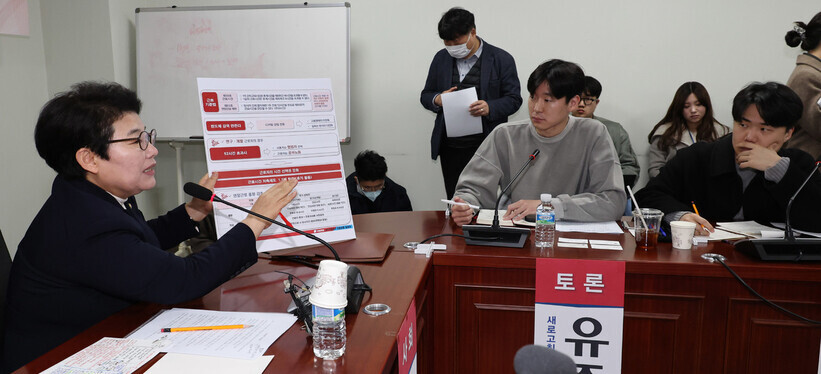hankyoreh
Links to other country sites 다른 나라 사이트 링크
Yoon calls 60+ hour workweek “unreasonable,” orders revamp of policy

In regard to the government’s workweek reform plan, South Korea’s President Yoon Suk-yeol has deemed it “unreasonable” to work more than 60 hours a week, even if one works overtime, according to the presidential office. Yoon’s office appears keen to calm the furor precipitated by its plan.
In a Thursday briefing from the presidential office, Ahn Sang-hoon, the senior presidential secretary for social affairs, said, “The Ministry of Employment and Labor proposed a bill that would allow the period of extended working hours to be determined by the agreement between labor-management during the month, quarter, half-year, and year. However, concerns have been raised that the bill may encourage long working hours.”
“President Yoon was concerned that the government’s draft bill did not put an appropriate cap on working hours and ordered it to be supplemented,” he said.
Yoon’s specific orders on the workweek reform plan came 10 days after the Ministry of Employment and Labor first announced its proposal on March 6. When asked about a deadline for the revision of the plan, a senior official at the presidential office said, “It’s not in line with the purpose of [Yoon’s directive] to put a time limit on it,” adding, “We will listen to the voices in the field and come up with complementary measures.”
Ahn’s briefing came unannounced as Yoon left for Japan. In releasing the president’s comments, the administration appears to be pulling out the big guns to put out the fires set off by heated criticism that followed the announcement of the workweek hour revision plan, which would extend working hours to a maximum of 69 hours (up to 80.5 hours in a seven-day workweek).
On Tuesday, Yoon stated through his chief press secretary that the ministry should “closely listen to the opinions that have been expressed during the legislative preview period of various workers, especially those of the MZ generation, and review what needs to be improved in terms of the bill’s content and the way that the news was communicated to the public.”
“MZ generation” is a term used in Korea to jointly refer to millennials and members of Gen Z.
In a National Barometer Survey released on Thursday, opposition to the workweek reform plan was higher than support for it, at 54% to 40%.
Against this backdrop, a young worker-led labor council that opposes the workweek reform plan repeatedly expressed their criticism at a debate held by the People Power Party.
“The argument that [the workweek] should exceed 52 hours is not an argument from the laborers’ side, at least,” said Yoo Jun-hwan, chairperson of the Refresh Labor Council. “It is questionable whether the government’s announcement is truly going in the direction that workers want, and whether it is reflected in the reform plan.”
By Lee Jae-hoon, staff reporter; Kim Mi-na, staff reporter; Sun Dam-eun, staff reporter
Please direct questions or comments to [english@hani.co.kr]

Editorial・opinion
![[Column] Life on our Trisolaris [Column] Life on our Trisolaris](https://flexible.img.hani.co.kr/flexible/normal/500/300/imgdb/original/2024/0505/4817148682278544.jpg) [Column] Life on our Trisolaris
[Column] Life on our Trisolaris![[Editorial] Penalties for airing allegations against Korea’s first lady endanger free press [Editorial] Penalties for airing allegations against Korea’s first lady endanger free press](https://flexible.img.hani.co.kr/flexible/normal/500/300/imgdb/original/2024/0502/1817146398095106.jpg) [Editorial] Penalties for airing allegations against Korea’s first lady endanger free press
[Editorial] Penalties for airing allegations against Korea’s first lady endanger free press- [Editorial] Yoon must halt procurement of SM-3 interceptor missiles
- [Guest essay] Maybe Korea’s rapid population decline is an opportunity, not a crisis
- [Column] Can Yoon steer diplomacy with Russia, China back on track?
- [Column] Season 2 of special prosecutor probe may be coming to Korea soon
- [Column] Park Geun-hye déjà vu in Yoon Suk-yeol
- [Editorial] New weight of N. Korea’s nuclear threats makes dialogue all the more urgent
- [Guest essay] The real reason Korea’s new right wants to dub Rhee a founding father
- [Column] ‘Choson’: Is it time we start referring to N. Korea in its own terms?
Most viewed articles
- 1New sex-ed guidelines forbid teaching about homosexuality
- 2OECD upgrades Korea’s growth forecast from 2.2% to 2.6%
- 3[Column] Life on our Trisolaris
- 4Months and months of overdue wages are pushing migrant workers in Korea into debt
- 560% of young Koreans see no need to have kids after marriage
- 6Korean government’s compromise plan for medical reform swiftly rejected by doctors
- 7[Guest essay] Maybe Korea’s rapid population decline is an opportunity, not a crisis
- 8S. Korea discusses participation in defense development with AUKUS alliance
- 9Presidential office warns of veto in response to opposition passing special counsel probe act
- 10Two lung cancer deaths at Samsung Electronics deemed occupational in nature